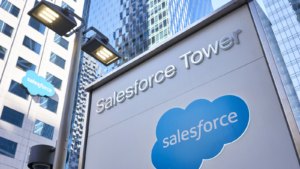
Standing shoulder to shoulder with trillion-dollar companies worldwide is a challenging goal for any company. To achieve this goal, companies must offer the best products and services in the market and become household names like Apple and Microsoft.
In addition to their well-defined advantage over most of their peers, these companies continue to grow and outperform the markets while building their empires.
To come up with the stocks for this article, I screened the realm of companies and came up with a shortlist based on this criteria. Each had to be a megacap (at least $200 billion market cap), and have a minimum of both a 5% year-over-year (YOY) earnings growth and 10% YOY revenue growth.
The following stocks are sorted based upon earnings growth, so let’s now focus on the names with the fastest-growing valuations.
Berkshire Hathaway (BRK-A, BRK-B)

The road to becoming a trillion-dollar stock is steep. The first in line to reach this rare club is Berkshire Hathaway (NYSE:BRK-A, NYSE:BRK-B), which currently stands as a megacap at $881 billion. Its portfolio companies include Dairy Queen, Geico and various industrial and insurance firms.
Also, Berkshire Hathaway holds a massive equity portfolio that includes blue chips like Apple and Amazon. And positions dominate by consumer companies like Kraft Heinz and Coca-Cola, financials like American Express and oil giants like Occidental Petroleum.
Warren Buffet’s investment style is simple. He identifies steady-growing businesses that are profitable and undervalued. Then he holds on to them for long periods. This allows Buffet to continuously add to his winning positions over time, which translates to the company’s revenue and earnings growth.
If we look at Berkshire’s latest financials, revenue grew 20.65% YOY, while operating earnings rose 21% YOY, a testament to his time-tested strategy. So, if you want to be part of Berkshire Hathaway’s history, it’s time to get some exposure right now.
Mastercard (MA)

The rival to another mega-cap, Visa, Mastercard (NYSE:MA), enables consumers, businesses and governments across the globe to conduct electronic forms of payment using its network, making payments more straightforward and faster.
Mastercard owns brands like Mastercard, Cirrus and Maestro. Those include consumer debit, credit, remittance, sales disbursement and other payment capabilities like automated clearing house transactions. With a market cap of $425 billion, Mastercard competes with Visa, American Express and Discover as the second major credit card payment network.
Looking closer at its financials, Mastercard delivered sturdy results. Net revenue grew 13% YOY to $25.1 billion, and adjusted diluted EPS increased 15% to $12.26.
It boasts a reputation as one of the top payment networks used globally. And its consistent revenue and earnings growth are driven by its core business diversified product offerings. Indeed, it could reach the top and be part of the elite trillion-dollar companies.
Salesforce (CRM)

If you have worked in a corporate setting, you may have heard of Salesforce (NYSE:CRM).
Considered the world’s leading CRM (customer relationship management) provider, Salesforce enables its customers stay on top of client interactions and sales data. Its platform of Customer 360 helps connect customer data across applications and systems. Then it extracts a complete view of customer interaction through analytics, artificial intelligence (AI) and automation.
Besides its strong foothold in the enterprise market, the company continues to grow. For example, Salesforce is looking at acquiring an AI-powered cloud data management vendor, Informatica, for a staggering $11 billion. While that steep expense might make investors fret, I think, when done correctly, it could be an investment that pays dividends for decades to come.
Fiscal year 2024 revenue was up 11% YOY, reaching $9.29 billion. Earnings were also up significantly, $4.25 compared to the previous year’s $0.21.
Additionally, Salesforce boasts impressive GAAP and non-GAAP operating margins for fiscal year 2024, at 14.4% and 30.5%, respectively. These margins reflect the company’s efficient cost management and operational excellence, contributing to its earnings growth.
With Salesforce’s adoption of AI and a promising outlook, the company will undoubtedly be one of the trillion-dollar juggernauts of the future.
On the date of publication, Rick Orford held long positions in MA and CRM. The opinions expressed in this article are those of the writer, subject to the InvestorPlace.com Publishing Guidelines.




